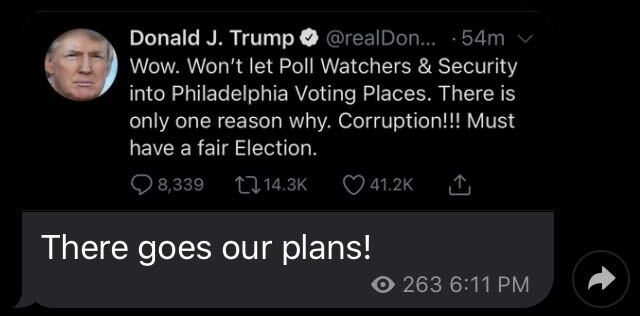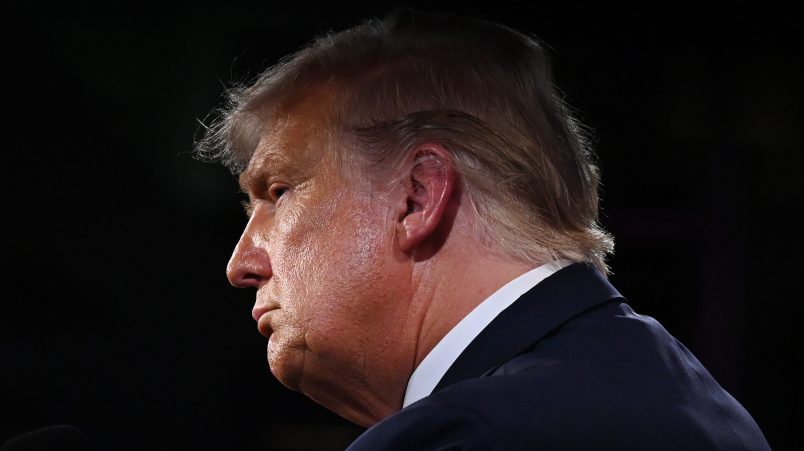In the final minute of Tuesday night’s presidential debate, President Donald Trump laid out something of an order for supporters of his: “I’m urging my supporters to go in to the polls and watch very carefully.”
Why? The President hasn’t left Americans to wonder: He wants that sweet, elusive “evidence” of widespread voter fraud he’s always talking about.
“If I see tens of thousands of ballots being manipulated, I can’t go along with that,” he said Tuesday.
“What does that mean?” moderator Chris Wallace pressed.
“It means you have a fraudulent election,” Trump responded.
If history is any indication, there will not be tens of thousands of manipulated ballots this election season. Though often invoked by the right, GOP operatives have repeatedly come up empty handed when asked to point to present-day examples of widespread fraud.
And yet Trump for months has laid the groundwork for claiming as much. He’s baselessly asserted dozens of times that mail-in voting is prone to tampering. And as he said in August, “the only way we’re going to lose this election is if the election is rigged.”
While legally-sanctioned poll watchers typically play the tedious role of ensuring that voters’ rights are protected and voting laws are followed, this year Trump supporters following the President’s directive are stumbling into the spotlight.
One woman claiming to be a Trump campaign poll watcher was refused entry at a Philadelphia elections office prior to Tuesday’s debate, the Philadelphia Inquirer reported, and for good reason: She wasn’t actually a sanctioned poll watcher. No poll watching is permitted at elections offices, only at polling places. And legitimate poll watching in Pennsylvania occurs only on Election Day.
“The propaganda that’s being generated by the other side is just that, chaos is the objective,” Pennsylvania Lt. Gov. John Fetterman (D) said on CNN Sunday, noting that the state didn’t experience any voter fraud or other significant issues during its primary elections this year.
“People in Pennsylvania need to understand that that’s all it is: Noise and distraction, propagated by an organization whose lone objective during this campaign season is to sow chaos, to create diversions away from an outcome they very well may not like,” Fetterman added.
Nonetheless, Trump tweeted about the woman and used her as an example of the ongoing supposed fraudulence of the election.
“As you know, today there was a big problem” in Philadelphia, he intoned at Tuesday’s debate. “They weren’t allowed to watch. You know why? Because bad things happen in Philadelphia.”
The Trump campaign didn’t respond to TPM’s request for comment.
“This is really another example of partisan folks creating/taking advantage of minor incidents to shake our confidence in the elections,” Suzanne Almeida, interim executive director of Common Cause Pennsylvania, told TPM.
There could be more rogue poll watchers on the way: The Philadelphia chapter of the Proud Boys, the right-wing street gang that Trump told to “stand by” during Tuesday’s debate, referred to Trump’s tweet about the rejected “poll watcher” in a post online Tuesday.
“There goes our plans!” they wrote. Reached by email, the group declined to elaborate.
 Megan Squire, a professor of computer science at Elon University who tracks the far-right online, told TPM that unsanctioned poll watching efforts could play a major role in the public perception of November’s elections.
Megan Squire, a professor of computer science at Elon University who tracks the far-right online, told TPM that unsanctioned poll watching efforts could play a major role in the public perception of November’s elections.
In addition to the potential that the Proud Boys will try to intimidate voters with their efforts, she said, “another very real problem — maybe even a bigger problem — is these guys and other bad actors amplifying harmful memes and fake news about the election process on social media.”
Michael Miller, a professor at George Washington University who focuses on autocracies, told TPM Wednesday that Trump may use the dirt these rogue poll watchers dig up to launch an attack on the election results themselves.
“There is a possibility he tries to massively disrupt polling places, but there’s maybe another piece of strategy, which is that he wants these poll watchers just to gather a bunch of anecdotes to claim fraud,” Miller said.
“If you just find three cases of examples, suddenly that’s a national story: ‘This happened in Philadelphia, this happened in Peoria,’ and it allows him to claim a national-level scandal,” he added.
Trump’s examples so far have been pretty weak: During the debate Tuesday, he claimed mailmen in West Virginia were “selling” ballots (wrong), that ballots had been found “in creeks” and “dumped in rivers” (nope), and that ballots had been “thrown out.”
The latter case was apparently a reference to nine military ballots in Pennsylvania that were discarded mistakenly, despite a peculiar statement from the local U.S. Attorney office that implied the opposite.
At a press conference Thursday, White House press secretary Kayleigh McEnany said Trump’s comment about ballots being “dumped in rivers” was really a reference to three trays of mail, including some absentee ballots, that were found in a roadside ditch last week in Wisconsin, though authorities have not said how many ballots there were nor if they had been filled out or not.
McEnany spent most of her answer on Trump’s “rivers” comment — she refused to acknowledge he was lying — criticizing the press for a “lack of journalistic curiosity” about the purported vulnerabilities of widespread mail-in voting.
“I’m very curious!” Fox News Radio’s Jon Decker responded. “Where’s the river?!”







Putin must be very proud of Putin’s puppy…
Who’s a good boy?
“Why? The President hasn’t left Americans to wonder: He wants that sweet, elusive “evidence” of widespread voter fraud he’s always talking about.”
NO!!! His primary reason seems clearly to be that he wants his folks out there to intimidate voters and reduce the likelihood of those who don’t support him to vote.
This is first and foremost a voter suppression move.
Not that this took the clairvoyance of Nostradamus, but I’ve been predicting that this is how they’d go about it for a long long time now. It’s been pretty obvious. Send 'em in and then have 'em run to Faux News et al. with story after story after story, and deluge the authorities with false, wild-eyed conspiratorial complaints for which they have no evidence but which nobody can disprove either. Meanwhile, nobody will get arrested for their false reports because that would just make it all worse in the long run and the police have better things to be doing (and support Trump anyway), so there will be a mountain of fakery to scoop through.
“See, Justice Barrett? We just can’t trust these results!!! We had to just appoint our own electors!!!”
LOL…and #wherestheriver trended all day I belive.
People with more credibility than the President at this point: